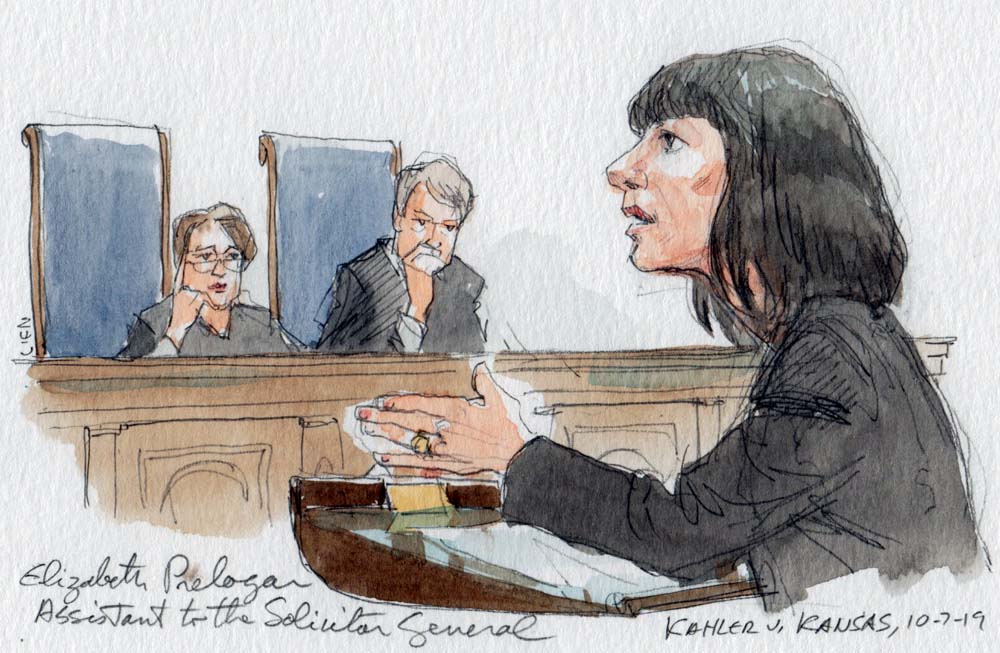SCOTUS Focus
Trump’s legal positions will test Biden’s acting solicitor general
on Jan 28, 2021 at 4:32 pm

“We didn’t change position in a single case. Not one.”
That was the determination of Neal Katyal when he took the helm of the Office of the Solicitor General on the first days of President Barack Obama’s administration in 2009. The solicitor general’s office is charged with setting and defending the government’s position in cases at the Supreme Court, and upon starting, Katyal had to decide what to do with inherited positions in a bevy of cases from President George W. Bush.
Katyal was talking to Paul Clement, who led the office during Bush’s transition from President Bill Clinton eight years earlier, in a conversation on Wednesday hosted by Georgetown’s Supreme Court Institute. Clement reported a similar approach. There “wasn’t a single case” already briefed at the Supreme Court in which he deviated from the Clinton administration’s position, he said, and “in the vast, vast majority of [lower court] cases, even some that were controversial … continuity was preserved.”
The two were together to discuss whether President Joe Biden’s acting solicitor general, Elizabeth Prelogar, would similarly choose to preserve all, or most, of the legal positions set by the Trump administration in live cases – a result they both deemed unlikely.
In pending cases involving the Affordable Care Act, immigration, voting rights and other high-profile issues, the Trump administration took positions that conflict sharply with the Biden administration’s policy views. But changing positions at the Supreme Court is no simple matter. It can risk undermining the traditionally apolitical reputation of the solicitor general’s office – and the justices often frown upon it.
“I think the current administration faces something very different than you or I did,” Katyal told Clement. Donald Trump’s solicitor general, Noel Francisco, was exceptional in a number of ways, including his willingness to abandon prior administrations’ legal theories more often than is typical. Under Francisco, the solicitor general’s office “switched positions like candy,” Katyal said.
Some of Francisco’s positions startled veterans of the office. Clement and Katyal highlighted California v. Texas, in which the Trump administration backed Republican states arguing that the entire Affordable Care Act should fall because its individual mandate to buy insurance or face a penalty was nullified by a 2017 law zeroing out that penalty. “I can’t think of any solicitor general, living or dead, who would take that position,” Katyal said. “Yet [Francisco] did.”
Historically, the solicitor general’s office has been seen as representing the permanent interests of the United States, not the political interests of any single presidential administration. “It has been the long-term position of the Justice Department to defend the constitutionality of statutes whenever reasonable arguments can be made,” Clement explained. In the ACA dispute, he continued, “even if you think part of a statute is unconstitutional, it would be in the long-term interests of the office … to have as little as possible of the act fall.”
Both characterized Prelogar — who started as acting solicitor general on Jan. 20 and will fill that role until a permanent solicitor general is appointed and confirmed — as likely to depart from Francisco’s modus operandi. Calling Prelogar “an institutionalist,” Katyal outlined the dilemma she faces: “Should [she] deviate from the position that is now filed in court … which itself deviated” from the position held by administrations that came before? On the one hand, Katyal reasoned, reverting to positions representing the “long-term” interests of the federal government is “probably called for if you are an institutionalist.” On the other hand, Clement countered, switching positions in a live case, especially one like the ACA dispute that is already fully briefed and argued, is a delicate matter.
In some cases, the Biden administration’s policy decisions may remove any need for a formal change in legal position. For instance, two cases involving controversial Trump immigration policies are scheduled for argument in the coming weeks: Trump v. Sierra Club, which involves the funding for Trump’s border wall, and Wolf v. Innovation Law Lab, which involves Trump’s “remain in Mexico” policy of forcing people seeking asylum at the southern border to stay in Mexico while they await hearings. Biden has already ordered an end to both policies, and the cases may now be moot.
Similarly, Biden has signaled his intention to review the Trump administration’s approval of Medicaid work requirements in some states. If the Biden administration revokes those approvals, then the Supreme Court case challenging them, Azar v. Gresham, could become moot.
In other cases, however, there is no possibility of mootness – meaning that Prelogar must decide whether to maintain the Trump administration’s legal positions. On March 2, for instance, the court will hear argument in Brnovich v. Democratic National Committee, which involves a Voting Rights Act challenge by the DNC against Arizona voting policies. The Trump administration filed a brief defending the policies. Prelogar must now decide whether to file a new brief repudiating that position and arguing that Arizona’s policies should be struck down.
Such decisions, Clement said, traditionally have been mostly free of political influence – even though, as a formal matter, the solicitor general reports to the attorney general, who reports to the president. Often called the “10th justice,” he said, the solicitor general’s office has a “sense of independence,” a shared understanding by its attorneys that it is “really facing towards the court.”


